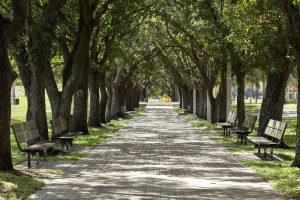
Property owners, professional landscapers and arborists struggle to keep Florida’s landscapes and tree canopies thriving amid hurricanes, pests, diseases, climate change and other impacts.
To help communities and industries plan, manage and treat some of the issues plaguing lawns, trees, plants and shrubs, scientists and faculty at the University of Florida have developed the South Florida Arboriculture and Landscape Professional Webinar Series.
“The purpose of the series is to provide an easily accessible educational resource to landscape and arboricultural professionals while highlighting the environmental and management considerations unique to south Florida,” said John Roberts, a commercial horticulture agent with UF/IFAS Extension Palm Beach County and webinar organizer.
On the third Thursday of each month, those who wish to attend can sign up for a one-hour webinar that begins at noon. Each month, a UF/IFAS expert will present research and new developments on a topic endangering trees and landscapes. Sessions are free for the public and $10 per session for arborists and landscape professionals in need of continuing education credits (CEU’s). The program is produced by horticulture agents from UF/IFAS Extension Brevard, Broward, Martin, Miami-Dade and Palm Beach counties.
Coming up on April 20 is Deah Lieurance, a UF/IFAS Extension scientist in the agronomy department and coordinator of the UF/IFAS Assessment of Non-Native Plants in Florida’s Natural Areas. Her presentation, “Staying Ahead of the Curve: Invasive Species Prevention and Prioritization,” will give participants an inside account at how she and colleagues conduct invasion risk and status assessments of nonnative plant species to determine if they should be recommended for use in Florida.
On May 18, attendees will learn the telltale signs of tree vulnerabilities in “Trees and Storms – Defects that Don’t Actually Appear to be Defective” with Andrew Koeser, associate professor of environmental horticulture.
Other topics throughout the year include establishing tree diversity, updates on tree pests and diseases, reducing storm and wind damage to trees and more. Each session requires a separate online Registration to access the webinar platform.
Keeping tree canopies and landscapes healthy provides various aesthetic, economic and environmental benefits to businesses and residential communities. Trees also shade homes to save energy, intercept rain to reduce stormwater, improve air quality by filtering pollutants and sequester carbon to offset emissions associated with climate change.
###
By Lourdes Mederos, rodriguezl@ufl.edu
ABOUT UF/IFAS
The mission of the University of Florida Institute of Food and Agricultural Sciences (UF/IFAS) is to develop knowledge relevant to agricultural, human and natural resources and to make that knowledge available to sustain and enhance the quality of human life. With more than a dozen research facilities, 67 county Extension offices, and award-winning students and faculty in the UF College of Agricultural and Life Sciences, UF/IFAS brings science-based solutions to the state’s agricultural and natural resources industries, and all Florida residents.
 0
0
